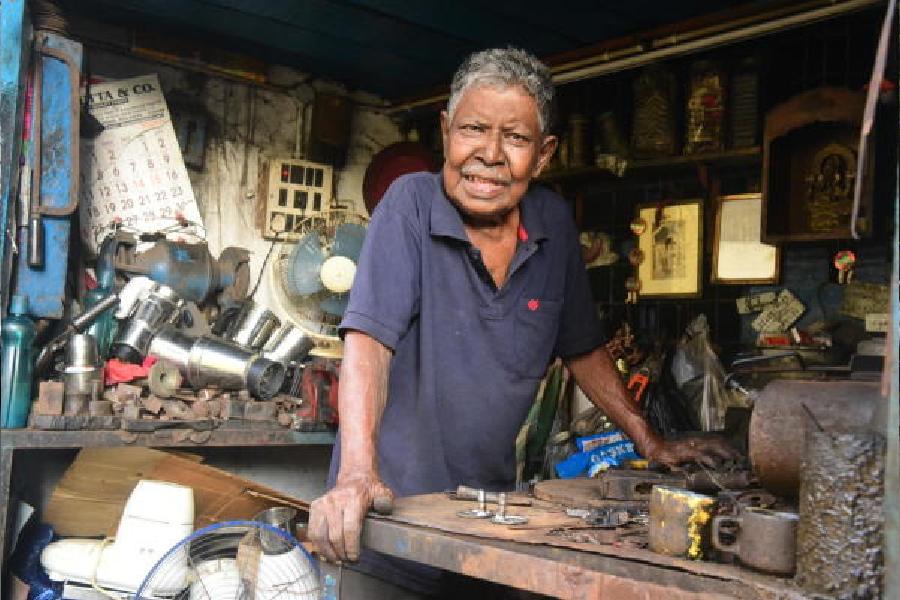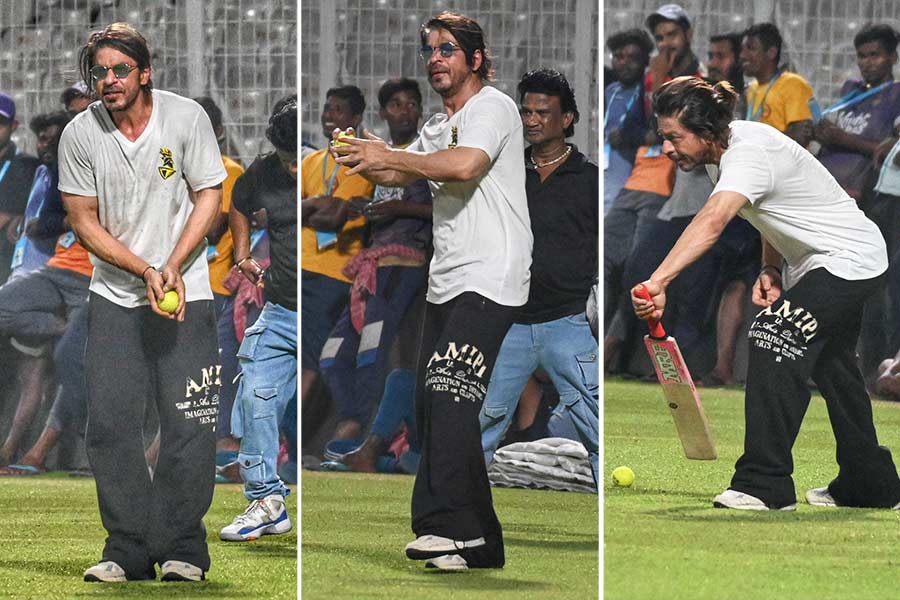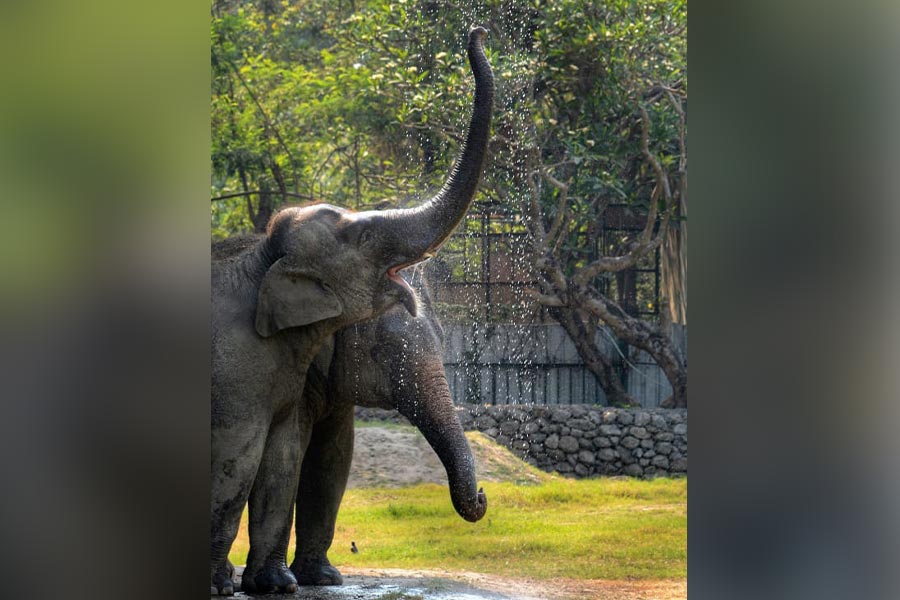Sitting in his utensil repairing shop in a narrow south Kolkata lane, Mukunda Manna, a robust 85, points at a house about 25 feet away and happens to disclose a rather remarkable fact about his shop. Among other things, his shop, a go-to place in the neighbourhood, has also worked as a daily wake-up alarm system.
Many years ago, one of the boys in the house Manna points at had a problem getting up in the morning. He requested Manna to somehow produce enough noise to wake him up. Manna was happy to oblige. “I would hit the pans really hard with something in the morning. The boy would get up,” he laughs.
Manna’s shop, located in Madhab Lane, off Sarat Bose Road, is one of those small establishments that rise straight up from the street, a few cubic feet partitioned from the street by two folding doors and an overhead shade. Manna, a master at his craft, is to be found inside, almost always, bent over a broken stove, perhaps, and surrounded by heaps of household stuff left in his care and a few machines to work on metals, even as a stream of pots and pans and pressure cookers descends from his shop to flood the street.
The street enters the shop, in return. Most of those who come here are from the neighbourhood and what they bring is not only a dysfunctional blender, but also real conversation, which perhaps sustains one no less than business. Manna knows everyone and everyone knows Manna. He feels free to talk about everyone freely, as he can, and does, about himself, with the ease of an elder of a community. “I have been living here for 75 years. I practically grew up here,” he says.
“I remember the day Gandhiji was killed,” he says. “I was about 10. I had just arrived in Kolkata. All lights were turned off that evening.”
Manna was born in Bagnan in Howrah. “There was no food at home,” he says. His mother brought him and his elder sister to the city and engaged him as an apprentice at a utensil-repairing shop nearby soon after they came. “I was about 10. I worked from 5am to 10pm every day and got 2 annas every day.” The three were living on the top of the shop, paying Rs 6 every month. “But the house was different then,” says Manna.
“Kolkata was both good and bad,” he says. The ways of the big city could scare a small boy from the village. Even its virtues, the presence of different people and communities, disturbed him. Back in the village, he had known a highly rigid and hierarchical social structure; the city’s freedoms — though these were the politically turbulent post-Independent years — could be baffling. “But the city was beautiful. The streets were clean. No vehicles entered this street,” he says. Now not a moment goes by without a bike roaring.”
He was good at his job from the beginning. After the initial round of fetching things for the seniors and basic jobs such as cutting of metal, he began to be given serious work, which was not only repair. “I cut through metal like water,” says Manna.
Still in his teens, he was asked to make raths on the occasion of rathayatra. “They were made of tin,” he says. “I worked for a month and made about 250 raths,” he says proudly. “They would be sold from here, in rows.” Then he was asked to make pichkaris (water guns) for Holi. “I made pichkaris of 4-inch, 6-inch, 8-inch, 10-inch and 12-inch diameters,” he says proudly again.
He has made laboratory items, such as dissection trays, and basic engineering goods.
He worked for about.10 years at this shop, at the end of which he was earning 14 annas a day. Then he was accused of stealing a bucket and was sacked. Which made him open his own shop at the current location.
“On my own, I did everything. Alone, relentlessly. I worked on buckets, metal drums, suitcases. I repaired stuff, did patchwork, and painted them.”
He reminds that he was not only a repairer. A special pleasure was painting old trunks, for long a part of the wedding trousseau. He would love painting the flowers on the trunk. This was a distinct tradition, especially the roses.
“Jaggery, sugar or batasa would be dissolved in water and mixed with red oxide. Then the patterns would be drawn with a shoe brush and a modified comb. You can draw flowers, plants, vines.”
Trunks had names: Raja, Rani, Maharani. A Maharani would have its corners intricately designed. Rani would have less design. The Raja trunk — not surprisingly — was the biggest.
Manna praises the exquisiteness of the locks that were made then. “That kind of work has vanished,” says Manna. “Now most of such work lacks substance. Six-storeyed buildings fall. How can a six-storeyed building fall?”
His business began to do well. He expanded and hired a godown space very close to his shop, where he still does his welding work. He also talks about other workshops in the para, which would take up industrial work. “But those places have shut down,” he says sadly. A customer drops in, gets back his repaired pan and pays Rs 20.
Manna recalls making the tin structure for Sare Batrish Bhaja sellers. This would have a big, open tin jar in the middle for muri and 32 other smaller open tin jars surrounding it for items to mix with the muri. Sare Batrish Bhaja was the classic muri mix; batrish means 32 and sare means half. “I asked what the sare meant here. I was told that it was ginger. It made for half an item, since it was raw and the rest were fried (bhaja).”
He says he can make for me the Icmic Cooker, a once popular device invented in Kolkata that would allow a number of items to be cooked together, making the food both healthy and easier to cook. “But let me warn you that at first you will not like the taste at all. Later you won’t be able to have anything else.”
At his own shop, Manna went from strength to strength. “I began to realise that I was earning something when I got home Rs 90 in a month. Or Rs 50 in a day. I was happy,” he says.
He felt he was at the height of his power when he could build a house of his own on E.M. Bypass. He had three children by then. He had even received an offer to go to the US once, but did not because he could not afford the airfare of Rs 12,000, he says.
But something happened in the 90s, when a wrong decision cost him the property he had built. He had to come back to the grind.
He still lives above the shop, but with the family of his eldest son now.
“I suffered too much during my childhood, found peace later but am suffering too much again, in my old age,” he says. “I remember my mother always. There is no one like a mother in the whole world,” says Manna. A few tears roll down his cheeks.
It is the evening before Janmashtami. A man comes with a small metal cradle, Lord Krishna’s sear, nicely made, but fallen off its stand. Manna lights up a stove, heats a thin iron rod with a rounded metal tip in the fire and tests if it is ready against his left palm, then fixes the stand. After a brief discussion about the puja at his place, the customer tries to bargain a little, saying Rs 100 is too much to pay.
Manna Dey sings love songs from a neighbouring house and rain compounds the approaching darkness.






